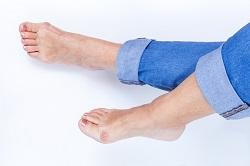Hallux valgus, better known as bunions, are a troublesome yet treatable problem that affects 23 to 35 percent of people according to a  statistic published by Podiatry Today. When bunions interfere with your normal daily routine and make it difficult to wear shoes, it's time to talk to someone. If you have this foot problem, learn what causes it and how bunions can be treated by Dr. Peter Siroka at his Stamford, CT office.
statistic published by Podiatry Today. When bunions interfere with your normal daily routine and make it difficult to wear shoes, it's time to talk to someone. If you have this foot problem, learn what causes it and how bunions can be treated by Dr. Peter Siroka at his Stamford, CT office.
What Are Bunions Exactly?
Many people incorrectly think that a bunion is an unnatural growth from the skin, but it's actually a bone that’s protruding from the inside of the foot. Take note of the fact that in most bunion cases, the big toe pushes toward the other toes—that’s due to the misaligned bone. Wearing bad shoes is the main cause of bunions, but experts have found that bunions run in the family.
Are Bunions Permanent?
As permanent as they may seem, bunions do not have to be a lifelong problem. There are therapies and treatments that can help the bone return to its natural position and ease pain. In many cases, stopping or reversing the action that caused the bunions to form in the first place is the first step toward healing. For instance, wearing shoes prescribed by your Stamford podiatrist instead of the ones that caused the bunions could make a major difference after just a few weeks. In other cases, surgery may be necessary.
Bunion Treatments
Here are a few of the most common bunion treatments that your foot doctor may recommend:
- Foot wrapping, taping and splinting (common for athletes)
- Orthotic inserts customized just for your foot
- Medication for foot pain caused by bunions
- A bunionectomy in cases that can't be corrected non-invasively. During bunion surgery, the protrusion is removed by realigning the bone
Consult a Podiatrist
Working, walking and exercising with a bunion isn't very pleasant, which is why you should contact your podiatrist ASAP for treatment or bunion surgery. Call (203) 614-8185 today for an appointment with Dr. Siroka at his Stamford, CT office.

